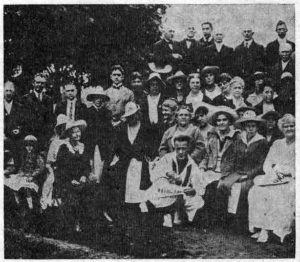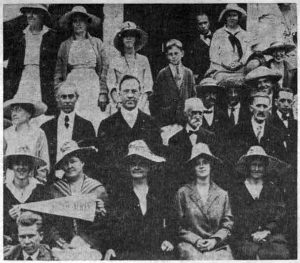 In casting about in her mind for a source of more material for this concluding article on the big Methodist picnic at the A.M. Ware farm, near Flemington, N.J., in the summer of 1919, your columnist suddenly bethought herself of the files of “The Suburban.” And there on the front page of the issue of September 5, 1919, was a two-column spread on the big event.
In casting about in her mind for a source of more material for this concluding article on the big Methodist picnic at the A.M. Ware farm, near Flemington, N.J., in the summer of 1919, your columnist suddenly bethought herself of the files of “The Suburban.” And there on the front page of the issue of September 5, 1919, was a two-column spread on the big event.
It now comes to light that this affair was a Labor Day celebration. By mere coincidence, your columnist wrote the first article for the present series for the September 4 issue of “The Suburban”, just 34 years, minus one day, from the date on which the original article appeared.
The start from Wayne was earlier than remembered by Mrs. Austin Houck, and given in last week’s column as 9.30. According to one original source, it was some two and a half hours earlier on a rainy Labor Day morning.
R.C. Ware’s costume, as commented on in previous columns, is explained by the fact that he was “constable” for the day’s outing, and wore on his chest the very large tin star which shows so clearly in the group picture in last week’s column.
Albert Ware was “traffic officer” for the 26 cars which started on the 58-mile run to Flemington. Just how many arrived is not a matter of record. However, these two sentences are suggestive of trouble along the way. “Ask Mr. Wolf, William Bryan and Austin Houck how many cars they gathered together and started going. It was like an army motor truck train, with a repair crew every few cars.”
Aside from these unexpected and unwelcome stops, the first scheduled halt was at the summer home of D.G. Bickley Burns, in Hatboro. The Rev. Burns, who was one of the guests of honor at the picnic, was at the time Methodist District Superintendent. Before going on their way to Flemington, the automobilists refreshed themselves with “quantities of grapes, pears, peaches and watermelons.” The next stop was at Lambertville, where the party pulled up at the Methodist Church and met with Dr. Wells, the pastor. However, as only “music and ice water were served here, the stop was not as long as at Hatboro.”
At Flemington, the Rev. B.F. Armstrong joined the group, making a total of seven ministers all bound for one picnic. In commenting on this number, “The Suburban” says that “either the crowd was such that they were needed or the company so good that they were wanted… or did the half chicken served each guest have anything to do with it?” The half chicken for each guest was but a part of the bountiful fare provided for the 200 guests assembled at the long tables set up in the big tent. A generalized description is given in the statement that “a chicken dinner with all the ‘fixings’ was there, real lima beans and the fruits of barnyard roosts, fields and orchards.”
 Once the dinner was over “a poultry parade” was held with the “ducks, turkeys and chickens marching along the line… that is, the ones that were still left alive.” And after this “everyone enjoyed the trip through the barns, the demonstrations of farm machinery, the tractor plows, the views of the fields and stock, and the close-ups of the orchards.” This was evidently done between showers, for “when the rain fell the tent was the gathering place where singing and laughter made everyone happy. It was like a Fair Day in a country town with games and crowds and joy.” Mrs. Houck, in giving her reminiscences to your columnist, recalls particularly the sweetness of the voices of the young people of the party, as their songs drifted out from the big barn.”
Once the dinner was over “a poultry parade” was held with the “ducks, turkeys and chickens marching along the line… that is, the ones that were still left alive.” And after this “everyone enjoyed the trip through the barns, the demonstrations of farm machinery, the tractor plows, the views of the fields and stock, and the close-ups of the orchards.” This was evidently done between showers, for “when the rain fell the tent was the gathering place where singing and laughter made everyone happy. It was like a Fair Day in a country town with games and crowds and joy.” Mrs. Houck, in giving her reminiscences to your columnist, recalls particularly the sweetness of the voices of the young people of the party, as their songs drifted out from the big barn.”
Eating was certainly the order of the day. For, to top off the chicken dinner, cookies and fruit in large quantities were passed out to the guests as the procession of cars made their way down the lane. Along with these refreshments each guest received “a neat booklet as a souvenir description of the farm.” On the last page was the verse:
“Good-bye – God speed you on your way,
The end, we trust, of a perfect day,
But whether one of loss or gain,
We know it wasn’t spent in Wayne.”
And so ended the big Labor Day picnic of 1919 on the New Jersey farm of Mr. and Mrs. A.M. Ware.
